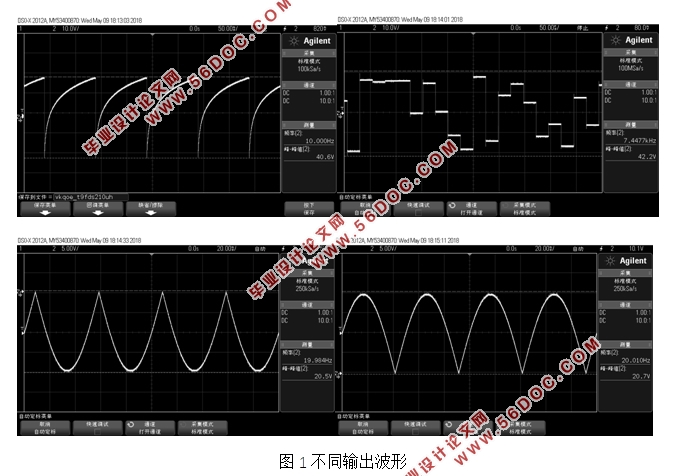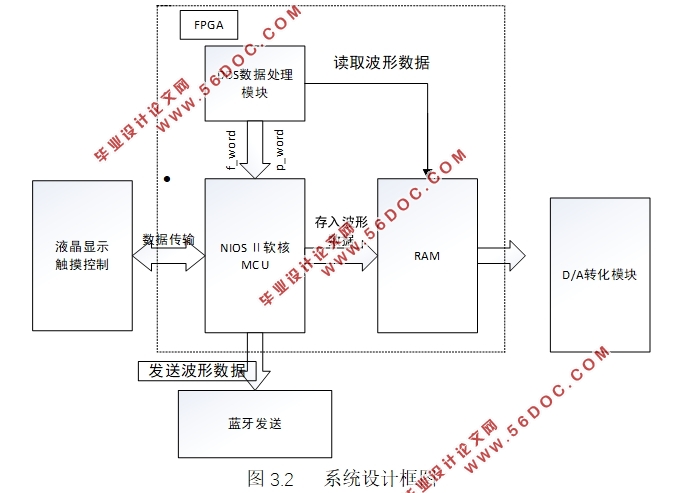基于FPGA的DDS多波形信号发生器设计(论文12000字)
摘要:随着经济的高速增长以及科学技术的快速发展,多波形信号发生器已经成为现代测试领域应用极为广泛的电子测量仪器之一,高精度且频率占空比可调的多波形信号发生器越来越重要。直接数字频率合成器(DDS)具有频率分辨率高、频率变换速度快、相位可连续变化等特点,比传统的频率合成技术性能优越的多且DDS应用技术越来越成熟。而现场可编程门阵列(FPGA)设计灵活、速度快、通用性好,广泛应用于数字集成电路的设计。本文将DDS技术与FPGA相结合,设计一种多波形信号发生器,其主要功能可以生成正弦波、三角波、方波、锯齿波等多种波形,频率、相位、占空比以及幅度可调,可以将波形信息发送到上位机模块并且可以通过浏览器访问网页来实现波形监测。该信号发生器主要由液晶显示、软核模块、DDS数据处理模块、D/A转换模块、低通滤波器以及上位机构成。经测试,该信号发生器可以稳定工作,操作灵活。
关键词:现场可编程门阵列;直接数字频率合成技术;信号发生器
DDS multi-signal generator based on FPGA
Abstract: With the rapid economic growth and the rapid development of science and technology, multi-waveform signal generators have become one of the most widely used electronic measuring instruments in the field of modern testing. Multi-waveform signal generators with high precision and adjustable frequency duty cycle have been developed. The more important it is. The direct digital frequency synthesizer (DDS) has features such as high frequency resolution, fast frequency conversion speed, and continuous phase change, which is superior to conventional frequency synthesis technology and DDS application technology is becoming more and more mature. Field programmable gate array (FPGA) is widely used in the design of digital integrated circuits due to its flexible design, high speed, and good versatility. This paper combines DDS technology with FPGA to design a multi-waveform signal generator whose main functions can generate sine wave, triangle wave, square wave, sawtooth wave and other waveforms. The frequency, phase, duty cycle, and amplitude can be adjusted. Waveform information can be sent to the host computer module and the browser can access the web page to achieve waveform monitoring. The signal generator is mainly composed of liquid crystal display, soft core module, DDS data processing module, D/A conversion module, low-pass filter, and upper computer. After testing, the signal generator can work stably and operate flexibly
Key words:FPGA, DDS, signal generator.


目录
第1章绪论 1
1.1 课题背景 1
1.2选题目的和意义 1
1.3 国内研究现状 1
1.4 论文的主要工作与章节安排 2
1.5 本章小结 2
第2章DDS波形发生器原理 3
2.1 DDS原理 3
2.2 DDS多波形信号发生器原理 3
2.3 DDS信号发生器的优缺点 5
2.3.1 DDS的优点 5
2.3.2 DDS的缺点 5
2.4 本章小结 5
第3章硬软件电路设计 6
3.1 系统设计要求 6
3.2 方案对比选择 6
3.3 DDS设计实现 7
3.3.1 相位累加器模块 7
3.3.2 相移模块 7
3.3.3 波形存储模块 8
3.3.4 D/A转换模块 9
3.3.5 低通滤波器模块 9
3.3.6 pll模块 10
3.3.7 显示与控制模块 11
3.3.8 蓝牙通信模块 12
3.3.9 软核模块 12
3.3.10 网页波形监测 13
3.3.11 上位机模块 14
3.4 软硬件平台介绍 15
3.5 本章小结 16
第4章软件仿真和分析 17
4.1 正弦波仿真 17
4.2 三角波仿真 18
4.3 方波仿真。 19
4.4本章小结 19
第5章实物测试与误差分析 20
5.1 实物测试 20
5.1.1 输出频率精度测试 20
5.1.2 方波占空比测试 24
5.1.3不同波形测试 27
5.2 误差分析 28
5.3 本章小结 29
第6章总结 30
参考文献 31
附录 32
致谢 33
|





